The 2010s: Moments That Defined a Decade
Ambar’s Appointment
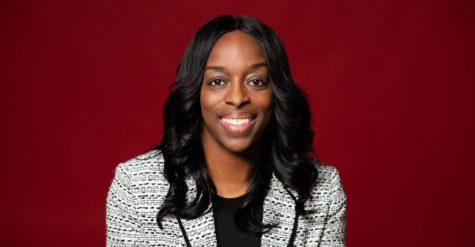
Following an extensive nationwide search, Carmen Twillie Ambar was introduced in May 2017 as the 15th president of Oberlin College and Conservatory. She is the institution’s first Black and second woman leader in its more than 180-year history.
Ambar was selected to replace outgoing President Marvin Krislov, now president of Pace University, at a particularly challenging moment in Oberlin’s institutional history. Faced with a growing structural budget deficit as soon as she stepped foot in Cox Administration Building, Ambar moved quickly to launch the Academic and Administrative Program Review, discussed in greater depth below.
From the time she arrived on campus, Ambar has displayed a commitment to engage with the Oberlin community. Her open office hours and meetings with student organizations in the basement of the presidential residence contrast with the Krislov presidency, the end of which was marked by a perceived lack of transparency.
In October 2018, Ambar was officially inaugurated as president during a weekend of celebratory events. Speakers included Sir David Adjaye and Johnnetta Cole, OC ’57. The weekend also featured the dedication of the Mary Church Terrell Main Library.
Gibson’s Lawsuit
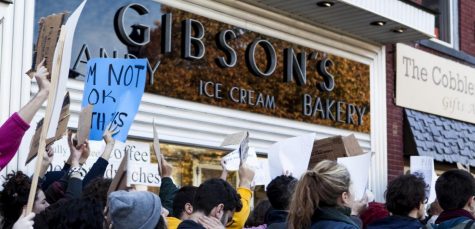
In November 2017, Gibson’s Bakery filed a lawsuit against the College and Vice President and Dean of Students Meredith Raimondo, alleging libel and intentional infliction of emotional distress. The tension between the College and the bakery began in November 2016 when an altercation took place between three students and Allyn Gibson, the son of the bakery’s late owner, David Gibson, which prompted student protests.
The 2016 altercation occurred after Allyn Gibson accused a student of shoplifting and followed the student and two friends outside the store. Allyn Gibson said the three students attacked him; the students said the opposite. Police were contacted by an eyewitness who was concerned about the students’ safety. The officers arrested the three students.
The day after these arrests, students protested outside of Gibson’s Bakery and conducted a boycott of the business. The three students involved are Black, and Allyn Gibson is white; some students alleged that they had noticed a pattern of racial profiling connected to the store. The three students involved in the initial altercation took a plea deal in August of the next year. As part of this deal, they pleaded guilty to shoplifting and read statements recanting allegations of racism against Allyn Gibson and the bakery.
About a year later, the Gibsons sued the College. In June 2019, a Lorain County jury ruled in their favor, initially awarding $44.2 million in damages. The College and Raimondo maintained that they never made statements against the bakery and that colleges cannot legally be held liable for the independent actions of students. The case is currently being appealed.
The AAPR
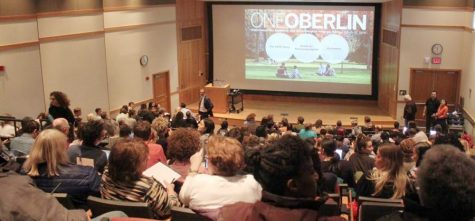
The Academic and Administrative Program Review, commissioned in 2018, was Oberlin’s first-ever institution-wide program review process. Over the course of a year, a 31-person Steering Committee composed of various institutional stakeholders conducted surveys, interviews, focus groups, and more to analyze nearly every aspect of Oberlin’s budget.
In February 2018, President Carmen Twillie Ambar presented on the financial uncertainty of the College. In her presentations, she disclosed that the institution’s structural budget deficit had reached $5 million the previous fall, and would continue to climb unless changes were made.
A year later, during the spring semester of 2019, the AAPR committee presented their final recommendations and published their findings in the official One Oberlin report, highlighting that Oberlin would face a budget deficit of $52 million by 2024 if no significant changes were made.
The committee structured its findings around three general categories: academic reorganization, curricular and co-curricular changes, and operational efficiency. Specific areas for reduction or growth were identified within those categories. Recommendations included reducing the enrollment of the Conservatory, introducing new integrative concentrations in Business and Public Health, and adjusting employee compensation.
Trump Wins Presidential Election
In the wake of President Donald J. Trump’s Election Day victory, the Review ran a front-page article with the headline, “Election Day Rattles Oberlin as Trump Prevails” (The Oberlin Review, Nov. 11, 2016). The result of the election came as a surprise to many Oberlin students, whose liberal ideologies did not align with the views of Donald Trump and his supporters.
While the Review initially reported that Trump defeated Clinton by a close margin of 388 votes in Lorain County, the final results found that Clinton bested Trump by 131 votes. In Ohio at large, 51.3 percent of the state went red, while 43.2 percent went to Democratic presidential nominee Hillary Clinton. Projections by some left-leaning organizations grossly understated the degree to which largely white, blue-collar voters in rural regions felt disenfranchised by the Obama administration — The New York Times, for example, projected that Hillary Clinton had an 85 percent chance of winning as late as 10:30 p.m. on Election Day.
The day following the election, the campus and town were noticeably morose — as a historically liberal bubble within the largely rural, conservative landscape of the state, many in Oberlin were shocked by the final result. However, fear and melancholy quickly gave way to action, as hundreds of students and community members gathered for a panel discussion that week to evaluate the national situation and decide how to proceed.
The past several years of campus activism have been marked by a distinct urgency. Keeping with Oberlin’s historical legacy of progressive action, students have worked tirelessly toward social, political, and economic justice for historically underrepresented minorities, especially those whose livelihoods are at risk due to the policies implemented by the Trump administration.
As the country nears the 2020 presidential election and the possible re-election of President Trump, Obies will undoubtedly try to correct the shortcomings of the 2016 election.
Karega’s Dismissal
In November 2016, the Board of Trustees voted to dismiss Assistant Professor of Rhetoric and Composition Joy Karega. In a Nov. 15, 2016 email announcement to the community, the board said Karega had failed “to meet the academic standards that Oberlin requires of its faculty and [failed] to demonstrate intellectual honesty.” Karega’s dismissal resulted from an extended review of posts Karega had made on her personal social media accounts that the board and others characterized as anti-Semitic.
Karega’s dismissal was upsetting to many community members. Some, including Karega herself, felt that she was unfairly targeted as the only tenure-track female Black professor in the Rhetoric and Composition program. Still, others felt that the board’s decision represented an important stand against anti-Semitism in higher education. The investigation into Karega’s conduct also ignited a national conversation about intellectual freedom in higher education.
In November 2018, Karega filed a lawsuit against the College claiming breach of contract and employment discrimination on the basis of race and gender. Karega initially sought nearly $1 million in damages. Earlier this week, Karega and the College reached a settlement of an undisclosed amount. While the legal process involving Karega has concluded, the questions raised by her dismissal and the circumstances around it continue to influence discourse at Oberlin and in the world of higher education.
First Lady’s Address
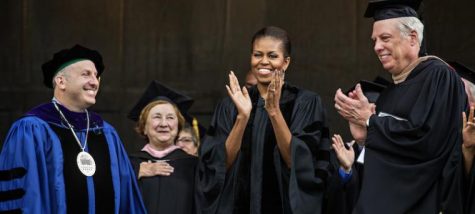
Each spring, graduating seniors eagerly await to hear who will deliver the last lecture of their undergraduate careers. In April 2015, the Oberlin graduating class received a surprise announcement: First Lady Michelle Obama would give the Commencement address alongside Marian Wright Edelman, founder and president of the Children’s Defense Fund.
Obama came to speak at Oberlin after selecting the Ninde Scholars Program as the winner of her “Near-Peer Mentoring Challenge.” The challenge encouraged institutions of higher learning to connect local low-income and first-generation high school students with college students in order to bolster college preparation. The Ninde Scholars Program provides academic resources, including Oberlin College student tutors and college accessibility workshops, to talented and underrepresented Oberlin High School students who wish to go to college.
In her Commencement address, Obama praised the College’s legacy of activism and its status as the first college in the United States to grant admission to Black students and women, commenting that “Oberlin is likely the only college in America that I could have attended nearly two centuries ago.”
The First Lady encouraged the Class of 2015 to “run to, and not away from, the noise” and to “actively seek out the most contentious, polarized, gridlocked places you can find to create meaningful societal progress.” Her advice echoed the message that she and her husband emphasized throughout their time in the White House — to be unabashedly bold, kind, and brave.
NEXUS Pipeline
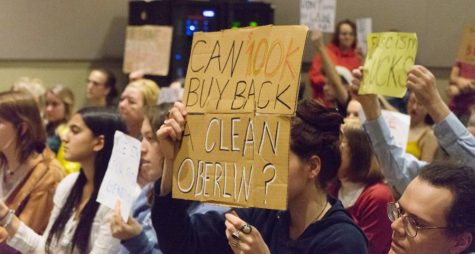
The past decade saw a lengthy legal battle transpire between the Federal Energy Regulatory Commission and the City of Oberlin regarding the construction and operation of the NEXUS pipeline, a 256-mile long natural gas pipeline that runs from Kensington, Ohio, to Canada. NEXUS construction was allowed in Oberlin through the use of eminent domain, which allows governments to convert private property into public property if it serves the greater good and grants “just compensation” to those affected. The pipeline’s construction concluded in July 2018.
In 2013, Oberlin residents voted for the Community Bill of Rights and Obligations. This ordinance affirms that the Oberlin community has a right to govern its relationship with the oil and gas industry and prohibits the construction of gas-delivery infrastructures within the City. The document was one of the primary arguments made against NEXUS.
Oberlin City Council has opposed the pipeline since 2013 and turned down the settlement offered to them in early 2018 by Enbridge Inc. and DTE Energy — the two corporations involved in NEXUS construction. Then, in September 2019, the U.S. Court of Appeals sided with a motion filed by the City and other plaintiffs, ordering that FERC issue a statement explaining its use of eminent domain. The City had argued that FERC could only authorize eminent domain to companies like Enbridge Inc. and DTE Energy for interstate projects — not international ones.
While the pipeline is currently active, the City of Oberlin continues to oppose its operation, as do many student activists.
Events of March 4, 2013
On March 4, 2013, Oberlin’s administration announced that it would cancel classes and hold a series of community events in response to a reported on-campus sighting of a person in Ku Klux Klan regalia. The alleged sighting had been preceded over the course of many weeks by a series of racist messages targeting Oberlin students.
“Canceling classes on March 4 was not solely a response to the reported sighting of a KKK member … but also about larger systemic issues that have been brewing on campus for far too long,” wrote the Review’s Editorial Board on Sept. 6, 2013 (“‘Hoax’ Declaration Mischaracterizes Bias Incidents, Stifles Productive Dialogue”). In some ways, the reported sighting served as a release for steadily increasing concern on campus, especially among students of color who had been targeted by the racist messages on campus and online.
The reported sighting on March 4 triggered widespread national media coverage of the events that had unfolded on campus. It also prompted the Federal Bureau of Investigation to open an investigation into a series of chauvinist events at the College. It was ultimately determined that two students had been responsible for instigating the series of hateful messages, and the students were removed from campus.
For the remainder of the spring 2013 semester, groups of students worked with administrators on a series of proposals to address community concerns and promote campus safety, particularly in regard to incidents of bias or hate.
Despite the collaborative spirit that emerged that spring, some students felt that administrators had withheld important information from students prior to the alleged KKK sighting. They asked administrators to be more proactive with communicating to students about the potential for such incidents in the future.
2012 Election
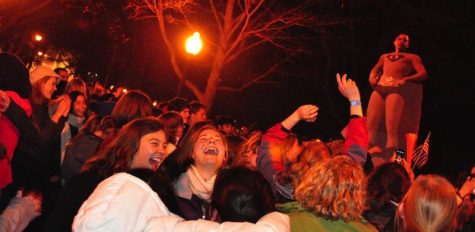
Barack Obama’s re-election in 2012 spurred an impromptu party in Tappan Square, a spontaneous jazz concert, and a ’Sco overflowing with cheers and students singing the national anthem.
“Everything is better!” said Annie Winneg, OC ’15 — at the time a College second-year — according to a Nov. 9, 2012, Review article.
Before the results were announced, the on-campus energy fluctuated from uneasy to excited. By 6:30 a.m., the polls at Philips Gymnasium already sported a line out the door. As the day progressed, students made bets with friends and watched live coverage in dorm rooms, Dascomb Dining Hall, Agave, and the ’Sco. Paul Dawson, at the time an Oberlin Professor of Politics, predicted that Obama was “gonna kill” Romney — others weren’t so sure.
By that evening, over 100 students had gathered in the ’Sco during an event co-hosted by then-College President Marvin Krislov to watch CNN’s coverage of the results together. Once Obama’s victory was announced, the space erupted with cheers and laughter, which soon overflowed outside and into Tappan Square. Throughout the night, fireworks were set off, a mosh pit was created; people hugged, streaked, and conga-lined. One student held up a life-size cardboard Obama, other students chanted “four more years,” and “free birth control.” Several Jazz majors gathered in the Tappan Square bandstand and played music for the crowd. The celebrations stretched late into the night.
Facilities Changes
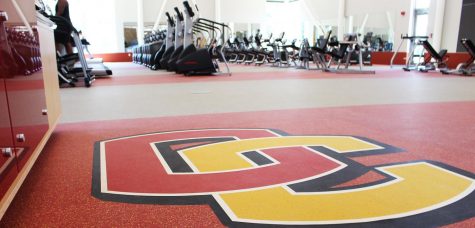
The last decade has witnessed many new developments in Oberlin. From the Oberlin Inn’s renovation into the Hotel at Oberlin to the relocation of the Student Health Center to what was previously Dascomb Dining Hall, Oberlin’s landscape has changed considerably since 2010.
Over the last 10 years, Oberlin rebuilt Hall Annex completely with the addition of the brand-new, adaptable Irene and Alan Wurtzel Theater, more classrooms, rehearsal studios, and costume shops to the building. The College also renovated the Little Theater into what is now Kander Theater. Similarly, in 2016, the Conservatory opened the Birenbaum Innovation and Performance Space, located within the Hotel at Oberlin. And in 2010, Oberlin opened the Bertram and Judith Kohl Building for Jazz Studies, Composition, Musicology, and Music Theory. With regard to athletics, the College introduced the Knowlton Athletics Complex in 2014 and the Shanks Health and Wellness Center in 2018, which included renovations to the Robert K. Carr Pool.
Furthermore, over the years, the College’s Multicultural Resource Center expanded and moved to what was previously International House and, in 2018, the lobby of Wilder Hall underwent remodeling.






